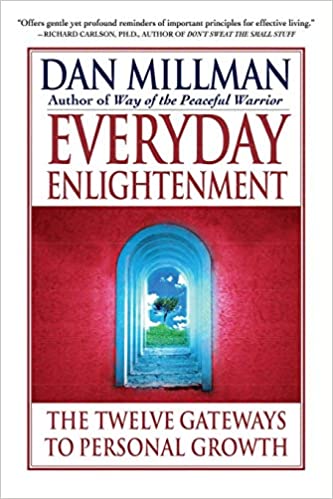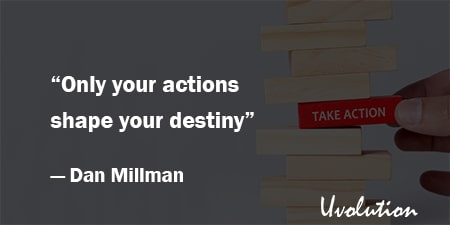Everyday Enlightenment by Dan Millman Summary
The Book in 1 Sentences
“When people ask me abstract questions about time, or space, or reincarnation, I may respond by asking whether they exercise regularly, eat a wholesome diet, get enough sleep, show kindness to others, and remember to take a slow, deep breath on occasion—because it seems important to bring our spiritual quest down to earth.
Of course, there’s nothing wrong with philosophical speculation. But let’s not mistake conceptual thought for the spiritual practice of everyday life. After all, what does it serve to know whether angels wear earrings if we can’t hold a regular job or maintain a long-term relationship?
What good does it do to pray like a saint or meditate like a yogi if we are unchanged when we open our eyes? What good to attend a place of worship on Saturday or Sunday if we lack compassion on Monday?”
“You are not here to contact your highest self; you are here to become it.” ~ Dan Millman
10 BIG Ideas
Everyday Enlightenment Book Summary
1. Discover Your Worth
“Self-worth is not a thing; it is a perception. Just as a gymnast begins a routine with ten points and receives deductions for each mistake, so you began life with a natural, complete sense of worth.
(Have you ever met an infant with self-worth issues?) But as you grow, you serve as your own judge, deducting points when you misunderstand the nature of living, and learning—when you forget you are a human-in-training and that making mistakes and having slips of integrity and mediocre moments are a part of life, not unforgivable sins.”
“It’s important to note that the most sensitive, self-reflective souls among us—those of us with the highest vision, ideals, and standards—often have the lowest sense of self-worth, because we constantly fail to meet our idealized standards. Maybe that’s why George Bernard Shaw once remarked that ‘the ignorant are cocksure and the intelligent full of doubt.’”
“You are no more or less worthy than any other person or part of reality. Your sense of worth grows by doing what is worthy. But you do not have to feel worthy; you need only treat yourself as you would a loved one or honored guest, ending self-destructive behaviors or cycles of self-sabotage, opening to life’s opportunities.”
2. Just do it
“Everything is easier said than done. But no matter how intelligent or talented you are, only your actions shape your destiny. To fulfill the promise of the second gateway, you need to know, and act upon, only three magic words: Just do it.”
3. How to change your habits?
“Make any positive behavior as convenient as possible. To break my habit of snacking in the evenings, I keep dental floss and a toothbrush in the downstairs bathroom near the kitchen. Right after dinner I floss and brush. I’m far less likely to snack, because if I eat something, I have to floss and brush all over again.
Make any negative behavior as inconvenient as possible. To smoke less, keep only one pack of cigarettes at home, in a small locked safe under some luggage in the closet in the garage. You might also put the television in that same closet, so you take it out only for special events, and use your old TV time writing that book, painting that picture, or learning a new language. In this way you replace old negative routines with new behaviors, pouring new energy into a new you.”
“Master yourself—your habits and tendencies—and you can accomplish what you will.”
4. Carpe punctum
“Most of us have heard the saying ‘Carpe Diem’—. A valuable reminder to live fully, but not a realistic idea, since you cannot seize the day. You can seize only the moment—this moment.
The quality of your moments produces the quality of your life. So, as thoughts come and go and the waves of mind rush on, Carpe punctum—Seize this moment. It deserves your full attention, for it will not pass your way again.”
“When motivation lags, your willpower takes over. You use your will when you stop waiting to feel motivated. Life has always come down to this: The ripest fruit grows on the highest limbs of the tree of life. To pick the fruit you make the climb, step by step, day by day.”
5. Face Your Fears
“Dar Robinson, one of the greatest modern-day daredevils, was terrified—practically scared to death—with each and every stunt. His heart leaped from his chest; he had to consciously control his rapid breathing; he sweated, he trembled, just like the rest of us—then he did what he had set out to do. This is what you and I can do in everyday life.”
“Your major battles with fear are not outside you; they lurk inside, in the caverns of the psyche, in the arena of psychological survival and dark imaginings, where fear shape-shifts into subtle guises such as self-doubt, insecurity, lack of confidence, shyness, inhibition, timidity—a reluctance to assert, express, or even be yourself.
Whatever form fear takes, your willingness to face it squarely will determine your fate in the high country of human potential.”
“Fear is a chameleon that can be a wise guide in one moment and a terrible tyrant the next. Respect fear, but never let it be your master. If physical danger is involved, listen well; if psychological danger challenges you, then do what you most fear—live as a peaceful warrior.”
6. Pain Vs Suffering
“Pain is a relatively objective, physical phenomenon; suffering is our psychological resistance to what happens. Events may create physical pain, but they do not in themselves create suffering. Resistance creates suffering.
Stress happens when your mind resists what is. If your spouse or lover leaves you, the amount of stress or suffering each of you experiences depends upon the meanings each of you places on the event.
If you believe it to be good, that you are not free, you suffer less; if you believe it is bad, that you are now alone, you suffer more. The only problem in your life is your mind’s resistance to life as it unfolds.”
7. Do what needs to be done!
“Of course, we don’t love painful feelings like anxiety or depression. We don’t have to love or even like them, but we do have to accept them, as difficult as that can seem at times.
Emotions, no matter how painful they are, are not the problem. The problem is dropping out of school or work, putting your family or duties of life on hold until such time as you can work out your emotional issues. Would you rather feel depressed while sitting alone in your room trying to figure it all out or feel depressed while getting your house cleaned or your project completed? (You may still feel depressed, but you have a cleaner house.)
The heart of accepting your emotions (and, as you’ve seen, of reclaiming your will) is to do what you need to do despite what you are feeling. Accept and learn from your feelings, but don’t let them run your life. By remaining productive during difficult emotional episodes, you are more likely to improve your emotional state than if you do nothing but ruminate and wait for sunny skies.”
“The most constructive way to influence your emotions is to do something.”
“Accept emotions completely, let your feelings be; just don’t let them run your life.”
“Life without emotions would be as calm as death, like a world without weather. Accept feelings as they are; pleasant or painful, they are natural and don’t need fixing. Let them rise and pass without allowing changeable emotions to run your life.”
“No one feels the same way all the time. Even if you are angry, depressed, crazy, afraid, or grieving, you’ll have moments when you are distracted. There are no enlightened people, no nice, bad, smart, neurotic, or stupid people, either—only people with more (or less) enlightened, nice, bad, smart, neurotic, or stupid moments.”
8. How to deal with money
“If you associate voluntary poverty with humility, goodness, and spirituality, then with what do you associate wealth? It is worth pondering, because what you believe about money will determine in large part your effectiveness in acquiring it.”
“While the Western solution to managing money is to pursue it, the Eastern solution is to avoid it. Disillusioned with the outward drives of the Western world, some of us turn to Eastern spiritual philosophies and practices, confusing the idea of letting go of attachments with earthly goods… Giving everything up doesn’t mean giving everything away. Rather, it involves living a simple, functional, ordinary life without clinging, craving, or holding on.”
“If spiritual life begins on the ground, money forms a foundation on which to build.”
Also read Spiritual Economics, Secrets of the Millionaire Mind, The Science of Getting Rich, and Rich Dad, Poor Dad book summaries
9. All love begins with self-love
“One of the strangest delusions believed by many of us is that it is good to love other people but bad to love yourself. I suggest that the more you are able to see, love, and accept the one facet of Spirit gazing at you from the mirror, the more you will be able to love Spirit within others.
If we are the same awareness shining through a billion separate forms, then all love begins with self-love. For the heart to awaken, it cannot exclude a single soul, including yourself. If you do not love yourself, how can you find the space to love others?”
10. Serve Your World
“As you transcend your own limitations and tendencies, you will naturally show loving-kindness to others. As your own light shines more brightly, you illuminate the world.”
“Find a form of service that calls to you, that suits your abilities, aptitudes, qualities, and interests, that makes time fly, that draws forth your best, that tells you you’ve arrived home and found yourself.”
“When you have seen what there is to see, when life has revealed you to yourself as you are, your search becomes how best to serve. Life itself—your work, family, and every interaction—is a chance to serve, to connect, to find meaning in the moment and purpose in the play.”
That was my QUICK summary of the great book Everyday Enlightenment by Dan Millman. If you’re interested, get your copy. There is a HUGE amount of life-changing ideas in this book, and we’ve only touched on a tiny bit of it.
Buy The Book: Everyday Enlightenment by Dan Millman

GET Blinkist 7 Days FREE Trial
3000+ Book Summaries
(Audio and Text)








